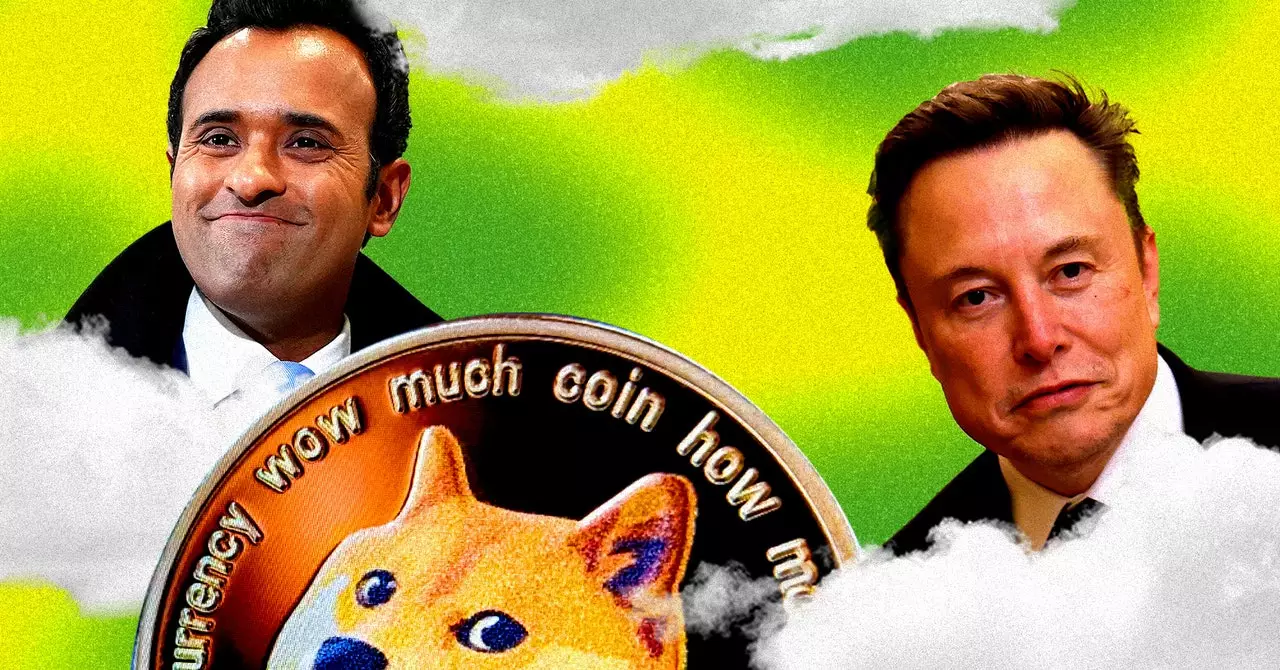In recent years, the cryptocurrency landscape has become a breeding ground for innovation, speculation, and sometimes sheer absurdity. Among the myriad options available to investors, one name has emerged not just as a digital asset but as a cultural touchstone: Dogecoin. Initially launched as a parody of cryptocurrencies, Dogecoin morphed from a mere inside joke among internet users into something far more significant. The convergence of technology, finance, and popular culture has created a complicated tapestry that demands scrutiny.
DOGE, which is sometimes conflated with the cryptocurrency Dogecoin, recently rebranded itself to represent the “Department of Government Efficiency.” At first glance, the acronym and its new meaning may seem frivolous, but underneath lies a profound commentary on the inefficiencies that often plague governmental systems—paradoxically using the meme culture that birthed Dogecoin as the vehicle for its message.
Interestingly, the conversation around DOGE has taken several turns, ranging from discussions about discipline in martial arts to philosophical dialogues on living longer. Such a diversity of topics may seem tangential, but they all contribute to a larger narrative about how we engage with ideas in our hyper-connected world. The mention of jujitsu serves as a metaphor for grappling with complex issues—be they economic, social, or philosophical. In a sense, each interaction, like each jujitsu move, demands technique and thoughtfulness, echoing the way we should approach discourse on technology and its broader implications.
In the same vein, podcasts and long-form discussions have proliferated as platforms for exploring these multifaceted themes. Lauren Goode and Michael Calore of WIRED exemplify this trend, discussing not just the mechanics of DOGE as a governmental initiative, but also the surrounding cultural narratives that frame its relevance. The 18-hour Joe Rogan episode featuring Marc Andreessen underscores this trend toward deep dives into intricate subjects.
One cannot discuss DOGE without acknowledging the key players behind it. Elon Musk, whose influence can make or break digital assets, plays a pivotal role. His endorsement of Dogecoin propelled it into the mainstream and set the stage for the new DOGE initiative. However, one may ask: does this influence come with ethical ramifications? It raises questions about the power dynamics in the crypto world and how celebrity culture intersects with technological governance.
The current flirtation with the concept of a “Department of Government Efficiency” is not just a whimsical idea. It reflects a yearning for a more streamlined approach to governance, one that’s adaptable and responsive to contemporary needs. By rebranding a cryptocurrency into a governmental framework, proponents aim to provoke discussion on whether existing bureaucratic institutions can—or should—adopt the agility of the tech sector.
The ludicrous nature of meme coins adds an intriguing layer to this narrative. What drives the success or failure of a coin named after an internet joke? Terms like “BONK” or “FLOKI” may incite laughter, but they also invite scrutiny about the value systems governing our financial commitment. There’s an ironic twist where something seemingly trivial has potential ramifications in real-world economic scenarios.
The common perception of meme coins often leans toward skepticism, given their tendency to fluctuate wildly based on social media trends and celebrity endorsements. Their ephemeral nature can often lead to considerable losses for uninformed investors. Yet they continue to fascinate. At times, they illuminate discussions about the meaning of value itself. What determines a viable investment? Is it utility, popularity, or simply the latest meme circulating the internet?
As the dialogue surrounding DOGE develops, it becomes increasingly clear that it’s more than just another meme coin. It raises essential questions about the intersection of technology, governance, and culture, an exploration that is both timely and critical. With influential players like Elon Musk in the mix, it remains to be seen whether DOGE can serve as a legitimate proposal for governmental reform or remain a passing cultural phenomenon.
Ultimately, the legacy of DOGE may hinge on our willingness to look beyond the surface of its antics and delve deeper into the implications it carries. Engaging in this discourse may empower us to redefine not only how we perceive cryptocurrencies but also how we envision the efficiency and adaptability of our governmental institutions. In a world inundated with noise, clarity of purpose in the midst of absurdity could just be the way forward.

